Toyota Yaris vs VW ID.4 - Differences and prices compared
Compare performance (280 HP vs 340 HP), boot space and price (21900 £ vs 34600 £ ) at a glance. Find out which car is the better choice for you – Toyota Yaris or VW ID.4?
Costs and Efficiency:
Looking at overall running costs, both models reveal some interesting differences in everyday economy.
Toyota Yaris has a convincingly advantage in terms of price – it starts at 21900 £ , while the VW ID.4 costs 34600 £ . That’s a price difference of around 12715 £.
Engine and Performance:
Power, torque and acceleration say a lot about how a car feels on the road. This is where you see which model delivers more driving dynamics.
When it comes to engine power, the VW ID.4 has a to a small extent edge – offering 340 HP compared to 280 HP. That’s roughly 60 HP more horsepower.
In acceleration from 0 to 100 km/h, the VW ID.4 is barely noticeable quicker – completing the sprint in 5.40 s, while the Toyota Yaris takes 5.50 s. That’s about 0.10 s faster.
In terms of top speed, the Toyota Yaris performs distinct better – reaching 230 km/h, while the VW ID.4 tops out at 180 km/h. The difference is around 50 km/h.
There’s also a difference in torque: VW ID.4 pulls convincingly stronger with 679 Nm compared to 390 Nm. That’s about 289 Nm difference.
Space and Everyday Use:
Beyond pure performance, interior space and usability matter most in daily life. This is where you see which car is more practical and versatile.
Both vehicles offer seating for 5 people.
In curb weight, Toyota Yaris is convincingly lighter – 1090 kg compared to 1975 kg. The difference is around 885 kg.
In terms of boot space, the VW ID.4 offers clearly more room – 543 L compared to 286 L. That’s a difference of about 257 L.
In maximum load capacity, the VW ID.4 performs clearly better – up to 1575 L, which is about 640 L more than the Toyota Yaris.
When it comes to payload, VW ID.4 barely noticeable takes the win – 551 kg compared to 525 kg. That’s a difference of about 26 kg.
Who wins the race in the data check?
The VW ID.4 is decisively ahead in the objective data comparison.
This result only shows which model scores more points on paper – not which of the two cars feels right for you.
Costs and Consumption
View detailed analysis
Engine and Performance
View detailed analysis
Dimensions and Body
View detailed analysis
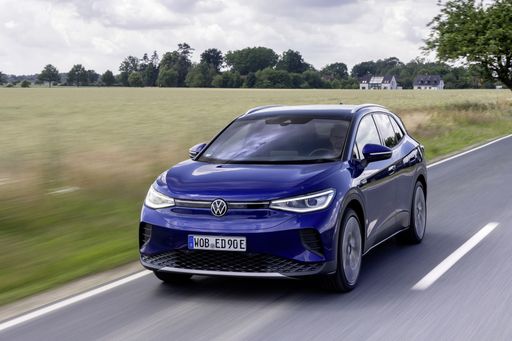
VW ID.4
Toyota Yaris
The Toyota Yaris is a sprightly city hatch that packs clever packaging, surprising comfort and fuel-sipping manners into a neat, easy-to-park package. It rewards sensible buyers with low running costs, friendly ergonomics and a forgiving drive, delivered with Japanese reliability and just enough personality to make errands feel a little less ordinary.
details

VW ID.4
The VW ID.4 is a calm, roomy electric SUV that turns everyday driving into a quietly confident experience, its practical packaging and smooth manners tailored perfectly for family life. Volkswagen's solid build and intuitive interior tech mean you get electric practicality without the sci‑fi theatrics, making the ID.4 a sensible, surprisingly likable choice for most buyers.
details
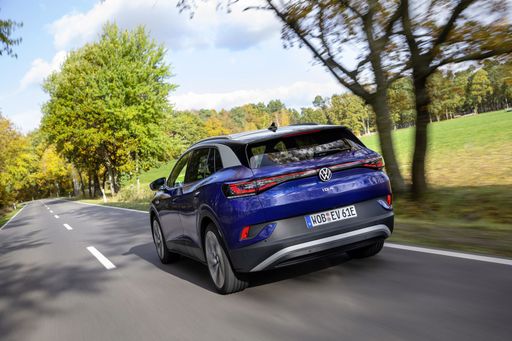
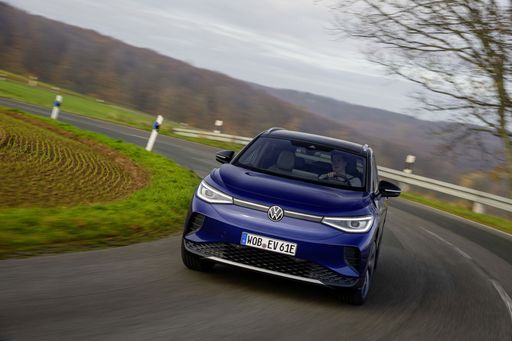
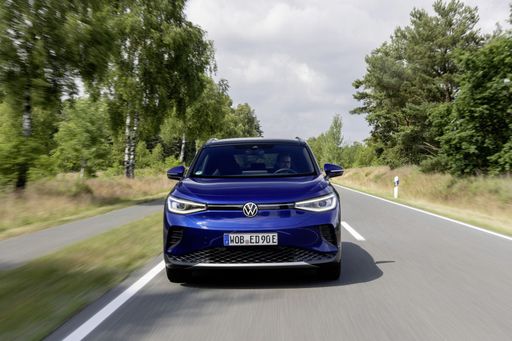
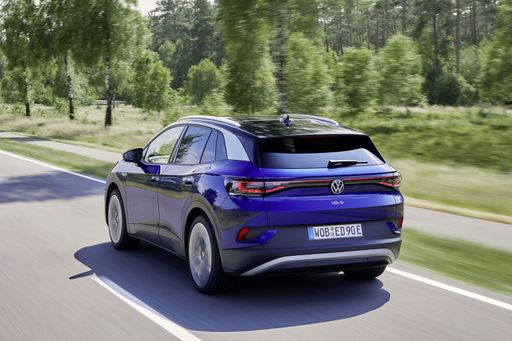

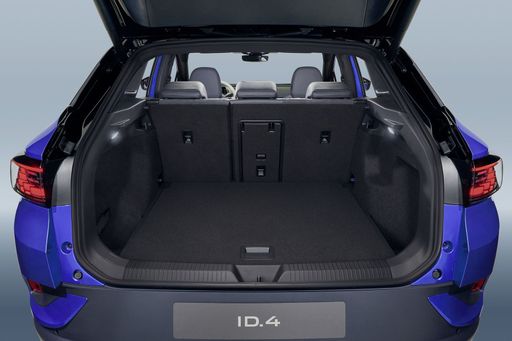
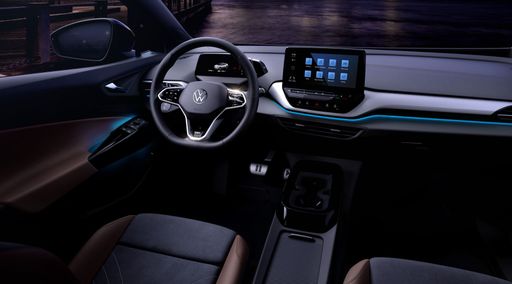
Costs and Consumption |
|
|---|---|
|
Price
21900 - 46700 £
|
Price
34600 - 47200 £
|
|
Consumption L/100km
3.8 - 9.5 L
|
Consumption L/100km
-
|
|
Consumption kWh/100km
-
|
Consumption kWh/100km
15.6 - 17 kWh
|
|
Electric Range
-
|
Electric Range
356 - 569 km
|
|
Battery Capacity
-
|
Battery Capacity
52 - 77 kWh
|
|
co2
87 - 215 g/km
|
co2
0 g/km
|
|
Fuel tank capacity
36 - 50 L
|
Fuel tank capacity
-
|
Dimensions and Body |
|
|---|---|
|
Body Type
Hatchback
|
Body Type
SUV
|
|
Seats
4 - 5
|
Seats
5
|
|
Doors
3 - 5
|
Doors
5
|
|
Curb weight
1090 - 1356 kg
|
Curb weight
1975 - 2248 kg
|
|
Trunk capacity
141 - 286 L
|
Trunk capacity
543 L
|
|
Length
3940 - 3995 mm
|
Length
4582 - 4584 mm
|
|
Width
1745 - 1805 mm
|
Width
1852 mm
|
|
Height
1455 - 1500 mm
|
Height
1619 - 1634 mm
|
|
Max trunk capacity
935 L
|
Max trunk capacity
1575 L
|
|
Payload
289 - 525 kg
|
Payload
515 - 551 kg
|
Engine and Performance |
|
|---|---|
|
Engine Type
Full Hybrid, Petrol
|
Engine Type
Electric
|
|
Transmission
Automatic, Manuel
|
Transmission
Automatic
|
|
Transmission Detail
CVT, Manual Gearbox, Automatic Gearbox
|
Transmission Detail
Reduction Gearbox
|
|
Drive Type
Front-Wheel Drive, All-Wheel Drive
|
Drive Type
Rear-Wheel Drive, All-Wheel Drive
|
|
Power HP
116 - 280 HP
|
Power HP
170 - 340 HP
|
|
Acceleration 0-100km/h
5.5 - 9.7 s
|
Acceleration 0-100km/h
5.4 - 9 s
|
|
Max Speed
175 - 230 km/h
|
Max Speed
160 - 180 km/h
|
|
Torque
390 Nm
|
Torque
310 - 679 Nm
|
|
Number of Cylinders
3
|
Number of Cylinders
-
|
|
Power kW
85 - 206 kW
|
Power kW
125 - 250 kW
|
|
Engine capacity
1490 - 1618 cm3
|
Engine capacity
-
|
General |
|
|---|---|
|
Model Year
2024 - 2025
|
Model Year
2023 - 2025
|
|
CO2 Efficiency Class
B, G
|
CO2 Efficiency Class
A
|
|
Brand
Toyota
|
Brand
VW
|
Is the Toyota Yaris offered with different drivetrains?
The Toyota Yaris is offered with Front-Wheel Drive or All-Wheel Drive.




